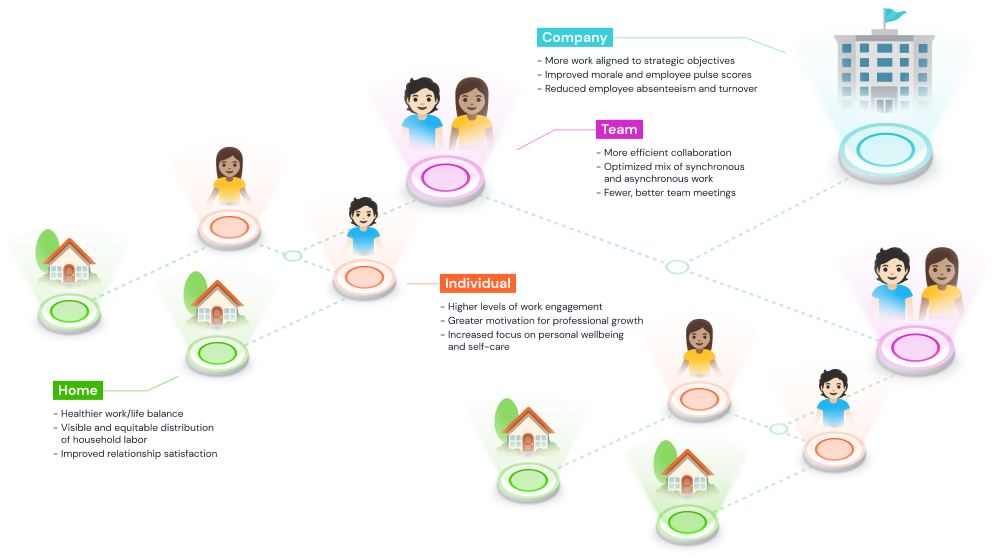
The Butterfly Effect 🦋of Adaptability & Resilience Skills
10 min
March 30, 2023 · 5 Minutes

The term digital native refers to people who grew up with the presence of digital technology and who are therefore comfortable with and fluent in technology. If you’ve been following the advancements in AI over the last few months, and no longer feel comfortable and fluent – you are not alone. And to be honest, feeling uncomfortable IS an appropriate reaction. While AI holds immense promise to benefit society, it also can present huge, existential risks to us as a population. That is why we signed on to the open letter calling for a pause to the training of AI systems more powerful than GPT-4.
But while the societal risks are of course of massive importance, in this post we want to focus on what we believe it means for the future of work, and specifically for remote and hybrid employees.
Let’s start with some bad news. If you work remotely, in some cases this may mean you are MORE vulnerable to being displaced by AI. Yes, we know that’s a controversial statement, but let’s look at why that is. It’s not your remote status per se, but rather it’s the type of job you might be doing as a remote worker, and how it’s measured. By definition, remote jobs typically involve you as a human interacting with technology, and many of these activities can now be automated easily. As an example, check out this video, one of thousands of use cases on YouTube today. Not only that, but as companies have adjusted to use more remote employees, many have realised that measuring effort no longer makes much sense, and instead are focused on measuring impact. Can you create MORE impact than an AI tool that never sleeps, never gets tired, and never goes out for drinks with friends? Even if you can today, will you be able to in 6 months’ time, as the models get more and more powerful.
But there is also some good news. Our research indicates that as a group, remote and hybrid employees are already more likely to have used AI technologies, at least in experimental ways, to help them get their job done (and if that doesn’t describe you, we strongly suggest you fix that state of affairs right now). That’s not surprising – remote employees are typically more digitally savvy, and more willing to experiment with working in non-traditional ways. This puts them in a position where they are more likely to use the upside of AI as a technology – to be the people in control of the machines rather than vice versa.
So, what does all this mean in terms of practical steps employees should take right now? We believe it boils down to three things.
Let’s look at each of these in turn in a little more detail
Playing with GPT is a great starting point – after just 10 or twenty questions, you will start to get a deeper understanding of its current capabilities. But remember that these capabilities ARE just a starting point. Many more will be opened up as these technologies become more deeply integrated into other tech. So check out lists of some of the more impactful AI technologies (this is a good list at time of writing, but the landscape is moving so fast you might want to Google your own. Don’t just read about them, use them. Every single person we have spoken to about these technologies expressed that they were unable to fully comprehend what the tools could do until they saw them with their own eyes.
The point of this exercise is not to demoralize you but rather to get you thinking about how you would use these and future technology innovations to help you create MORE impact – AI with you at the center – more on that later.
Let’s make this clear. You are NOT going to win in the workplace medium term by doing the same things these AI models do. But you don’t have to. Think forward to a future where every organization has identical access to these tools. What will differentiate one from another? Well, the only thing that can make them unique, the human beings that work inside those organizations. And what differentiates you from other humans? Your soft skills, or perhaps what we might call your human skills. In the future of work, human is your superpower. If you are a remote or hybrid employee, this is particularly important, as it really is what makes you stand out from your human and computer generated competition.
Right now, you should be spending as much or more time honing your soft skills than you have ever spent developing job-specific skills. The future, successful you is someone with a deep understanding of their human gifts, who uses them in the work they do with other humans and with the AI systems that they orchestrate. If you are working with us already, you know BillionMinds helps you develop the most important soft skills you need as a remote or hybrid employee and allows you to prove them through certification. It’s never been a more important thing to do.
If you are like most employees, your historical view of work is centered around working hard, maintaining good relationships with colleagues, and doing what is asked of you. If you consistently do those things, you will likely keep your job. Well, the goalposts have moved somewhat, and it’s never been more important to “work smart”. Working smart in this context means thinking like the designer of a factory, constantly looking for optimizations using the tools available to you. Think of it in this way. If you are working 12 hours a day to get something done that COULD be done in two by some clever automations and sensible use of AI – what will you do when the next piece of work arrives? Work 14 hours instead? The most successful employees in the coming era will be those who put themselves at the center of the AI orchestra, effortlessly conducting it for amazing results, while using their human skills to form a great translation layer between other humans and technologies. That, with some work and some focus, can be you.
If you are not excited about AI, you should be. If you are not worried about AI you should be. If you are not using AI, you definitely should be. So, get started now, because there is not that much time. And while you are at it, focus deeply on developing the human soft skills you will need to stand out in a world where AI will rise, but humans will be the differentiator.